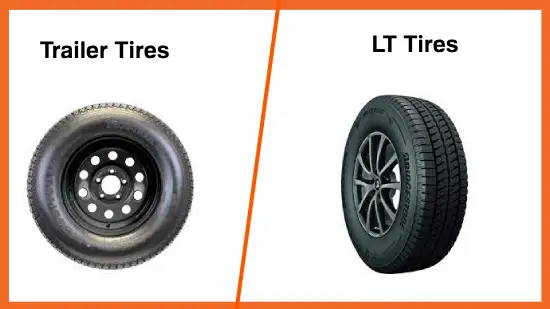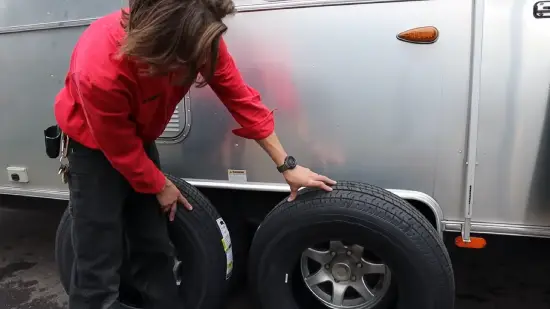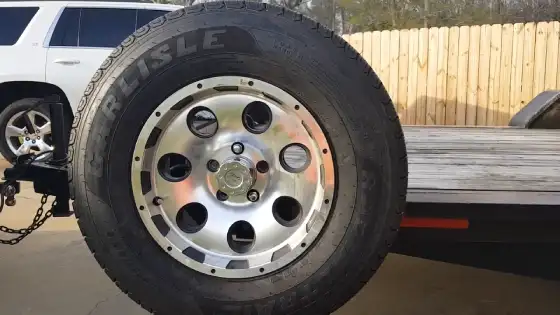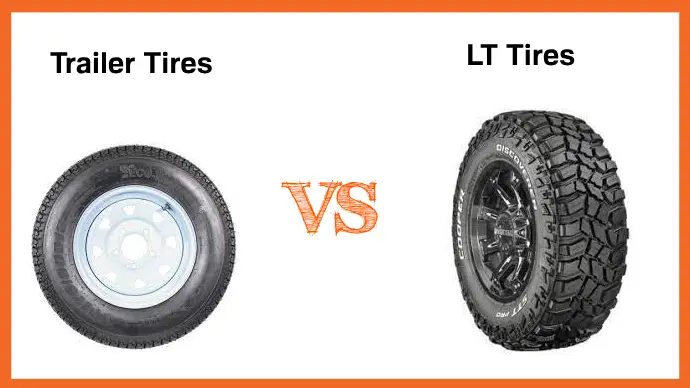Last Updated on August 13, 2023
Proper tires selection for your trailer is essential for safe and efficient travel. As you check off your old trailer tires, you might wonder about installing the new tires on your trailer. Should you use trailer or LT tires, and what’s the difference between them?
Although trailer and LT tires have advantages, understanding the differences is critical for making an informed decision. Trailer tires are specifically designed for trailers, while LT tires are designed for light trucks. That’s why trailer tires typically have a higher load capacity and ratings than LT tires.
Today we’ll explore the critical differences between trailer tires and LT tires, including their construction, performance, and maintenance requirements, so you can decide which is best suited for your travel trailer. So read on for more details.
Trailer Tires vs LT Tires: Understanding the Key Differences

If you want to understand the key differences between trailer tires and LT tires, there are a few important things to consider:
- Purpose and Design
- Load Capacity and Ratings
- Speed Ratings
- Tire Construction
- Tread Patterns
- Recommended Applications
- Considerations for Switching
- Tire Longevity and Maintenance
Purpose and Design:
Trailer tires (ST tires) are engineered with stiffer sidewalls to provide stability and prevent trailer sway, prioritizing towing stability and load durability over traction and driving comfort.
Conversely, light truck tires (LT tires) are intended for light trucks, SUVs, and vans, offering a comfortable ride for passengers and focusing on traction and driving performance. The purpose and design of each tire type can be compared and contrasted in the following table:
| Category | Trailer Tires (ST Tires) | Light Truck Tires (LT Tires) |
| Intended Use | Specifically for trailers | Light trucks, SUVs, and vans |
| Sidewall Stiffness | Stiffer sidewalls for stability | May not have the necessary stiffness for heavy loads |
| Load Capacity | High load capacity for heavy trailers | Variable depending on tire type and size |
| Traction | Prioritizes towing stability over traction | Focuses on traction and driving performance |
| Driving Comfort | May not provide a comfortable ride | Offers a comfortable ride for passengers |
Load Capacity and Ratings:
It’s amazing how often people overlook the load capacity and ratings when choosing the right tire for their vehicle.
Regarding trailer tires vs LT tires, the load-carrying capacities and ratings are crucial factors to consider. Here are some key differences to keep in mind:
- ST tires have higher load ratings than LT tires of the same size and inflation pressure, making them suitable for hauling heavy loads in trailer towing applications.
- LT tires may not provide the same load capacity as ST tires for heavy trailer applications, although they can handle moderate loads.
- The ply ratings of LT tires differ from passenger car tires, and their sizes are specific to light truck applications.
Speed Ratings:
With a maximum speed rating of 65 mph, ST tires can experience heat buildup and tire failure if driven above their specified limit. In contrast, LT tires often come with higher speed ratings, up to 100 mph. However, adhering to the specified speed limits is essential to avoid excessive heat buildup and potential tire failure.
Tire Construction:
With ST tires, you can imagine a reinforced construction that provides increased sidewall strength and protection against UV rays. In contrast, LT tires focus more on providing traction, driving comfort, and handling characteristics for light trucks and SUVs.
This difference in construction is reflected in the materials used for each type of tire.
Trailer tires come in two types: D and R. D tires are typically made with bias-ply construction, while R tires are made with radial construction. The construction type affects tire durability and performance.
Conversely, LT tires generally have thinner sidewalls and a softer rubber compound, which allows for better handling and a smoother ride. A comparison between the two tire types can be seen in the table below:
| Tire Type | Sidewall Strength | Aging Resistance | UV Ray Protection | Traction | Driving Comfort | Handling |
| ST Tires | Increased | High | Yes | Moderate | Good | Fair |
| LT Tires | Moderate | Moderate | No | Good | Excellent | Excellent |
Tread Patterns:
ST tires feature tread patterns designed for low resistance, ease of towing, & better mileage. These prioritize rolling efficiency over aggressive traction patterns, making them ideal for highway use.
In contrast, LT tires offer a wide range of tread patterns optimized for light trucks, SUVs, and off-road capabilities rather than trailer towing. These tread designs are created to enhance traction on different road surfaces, making them ideal for rough terrains and off-road adventures.
Recommended Applications:
ST tires are specifically designed for trailer axle positions and are the ideal choice for travel, utility, boat trailers, and other towed applications.
On the other hand, LT tires are primarily intended for use on light trucks, SUVs, and vans, carrying passengers and moderate loads. While LT tires can be used for certain light-duty trailers, they are not optimized for trailer towing.
Considerations for Switching:
Now that you’ve understood the recommended applications for trailer and LT tires consider the potential challenges of switching from one to the other. This requires careful evaluation of various factors, including load ratings, tire sizes, and intended use.
To help you make an informed decision, we’ve compiled a list of considerations to keep in mind before making the switch:
- Ensure the chosen LT tire meets the application criteria for your specific trailer.
- Evaluate the tire construction to ensure it can withstand the demands of towing.
- Consider the potential impact on your vehicle’s handling and braking.
Tire Longevity and Maintenance:
To avoid the hassle of constantly replacing worn-out tires, you must pay attention to the maintenance and upkeep of your trailer’s rubber. Trailer tires (ST tires) have a shorter lifespan than passenger cars or LT tires due to higher weight, sidewall stress, and user-related issues.
Regular maintenance, proper inflation, and inspections ensure tire longevity and safety. This means regularly checking tire pressure, inspecting tires for damage or wear, and replacing tires before they become too worn.
Can LT tires be used on a trailer?

You can safely and confidently use LT tires on your trailer as replacements for ST tires. LT tires have several advantages over ST tires, such as higher load capacity, better durability, and longer tread life. To illustrate, consider the following table:
| LT Tire | ST Tire | |
| Load Capacity (per tire) | 2,500 lbs | 2,200 lbs |
| Durability | Higher ply rating and thicker sidewalls | Lower ply rating and thinner sidewalls |
| Tread Life | Longer due to deeper tread depth and better rubber compounds | Shorter due to shallower tread depth and inferior rubber compounds |
LT tires have a higher aspect ratio (sidewall height to tire width) than ST tires, affecting trailer stability and sway control. Therefore, it’s recommended to consult with a tire professional and check your trailer’s owner manual for the appropriate tire size and inflation pressure before switching to LT tires.
What is the advantage of an LT tire?
Riding on LT tires is like having a suit of armor for your vehicle. They provide heavy-duty construction and cut-resistant tread rubber for ultimate protection and longevity. These tires are designed to withstand bruising and impacts, making them ideal for heavy-duty hauling and towing.
The tread rubber compounds used in LT tires are specifically formulated to resist cuts and chips, ensuring that the tire lasts longer and performs better in harsh conditions. Additionally, all-terrain and max-traction LT tires are perfect for off-road adventures, providing superior traction and grip on uneven terrain.
What makes an LT tire different?
LT tires are specifically designed for larger vehicles and built with tougher constructions and hardier rubber compounds. Their higher load-carrying capacities set them apart from standard tires, making them perfect for larger trucks, SUVs, and commercial vans.
These tires are constructed to withstand the additional weight and stress of these vehicles, making them a reliable choice for those needing to transport heavy loads or navigate rough terrain. Also, their stiffer sidewalls provide better handling and stability, reducing the risk of blowouts or other tire-related accidents.
Do LT tires need more air pressure?
LT tires require higher air pressures to carry equivalent loads because they are designed to handle heavier loads than a standard passenger tire. Failure to adjust the air pressures to achieve the vehicle’s load requirement will result in tire fatigue and eventual tire failure as a result of too much heat buildup.
Regularly check and adjust the air pressure in your LT tires to ensure they carry the load they are designed for. Neglecting this simple maintenance task can lead to costly tire replacements and potentially dangerous situations on the road.
Are LT tires more puncture resistant?
If you’re driving on rough terrain or debris-filled roads, you’ll appreciate the added thickness of the tread on LT tires, which can provide more resistance to punctures. The tread’s increased thickness contributes to the LT tire’s puncture-resistant capabilities.
However, puncture resistance also depends on factors such as tire construction, materials, and design. To compare the puncture resistance of trailer tires and LT tires, let’s take a look at this table:
| Trailer Tires | LT Tires | |
| Tread Depth | Usually shallow | Usually deeper |
| Ply Rating | 4-10 | 6-12 |
| Load Range | C-G | C-E |
As you can see, LT tires have deeper tread depth, higher ply ratings, and higher load ranges than trailer tires. These features make them more rugged and durable, leading to better puncture resistance.
Are truck tires and trailer tires the same?
Truck tires and trailer tires are not the same. While light truck tires can handle the same heavy loads as heavy-duty trailer tires, they lack the necessary stability due to differences in their internal structures.
Truck tires have a softer sidewall construction designed for better traction and ride comfort, whereas trailer tires have a stiffer and more robust sidewall to handle the heavyweights of payloads.
The tread pattern of truck tires is also different from trailer tires since their primary concern is on-road driving performance and cornering ability. In contrast, trailer tires feature a more straightforward and predictable tread design that maximizes traction, durability, and stability.
What is the primary advantage of trailer tires?

Trailer tires are specifically engineered for the unique demands of pulling heavy loads over long distances. One crucial advantage of trailer tires is their enhanced durability.
These tires are designed to handle the high inflation pressures and heavier loads common with trailers without sacrificing performance or safety. They feature a stiffer sidewall construction than most passenger and light truck tires, providing better resistance to bruises and punctures.
Also, trailer tires offer reduced sway with stiffer sidewall construction, making them an ideal choice for towing larger payloads. These tires provide superior traction, durability, and stability that other types of tires cannot match.
ST Tires or LT Tires: Choose Safely for Trailer or Tow Vehicle
There are many factors to consider when choosing the best tires for your trailer or tow vehicle to ensure safety, performance, and longevity.
ST tires are designed for trailer use, offering better stability, load durability, and towing performance. While suitable for light trucks and SUVs, LT tires may provide a different level of sidewall stiffness and load capacity than ST tires.
Although LT tires can be used on a trailer, it’s not recommended as they may need help handling the trailer’s weight and load capacity. If you’re looking for better performance and durability for your light truck, an LT tire may be the way to go. So, understand the tire safety ratings and drive safely.




Looks like an article written by AI and not anyone with actual tire design experience. Some statements are true while others are not.
Thanks for sharing your thoughts. There’s something special about driving through nature and dealing with the occasional challenge on the road. It’s all part of the adventure!
Regarding the article, I appreciate your feedback. It’s true that the topic of trailer tires vs. LT tires can be quite complex. My goal was to present information straightforwardly, but I understand that some points might need more depth or clarification. If you have specific experiences or insights about tire design, I’d love to hear them. It’s always great to get hands-on input from those who are concerned about these issues.
Feel free to share any useful tips or tricks. Sharing knowledge helps everyone, especially when it comes to overcoming those pesky vehicle problems. Thanks again for engaging with the blog!